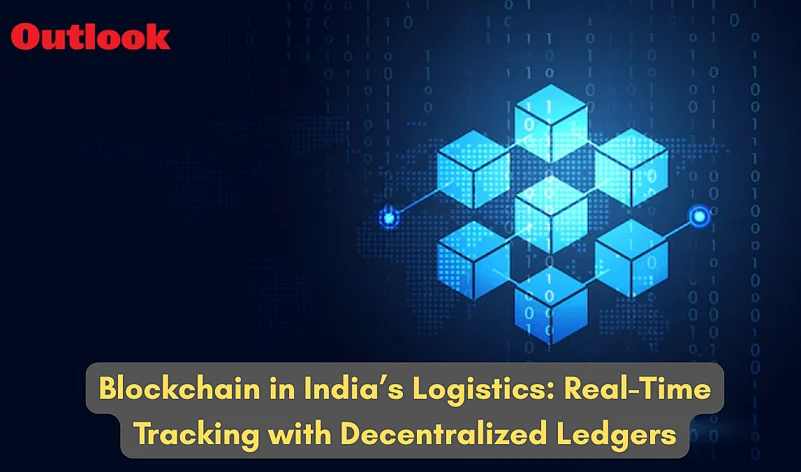In a country as vast and complex as India, the logistics sector forms the unnoticeable thread suturing together its profitable fabric. From moving agrarian yield across countries to delivering critical artificial factors to manufactories, logistics energies trade, commerce, and everyday life. Yet, despite its centrality, the assiduity is frequently mired in inefficiencies, lack of translucency, and trust poverties across the force chain.
This is where blockchain — the important- talked- about decentralized tally technology is beginning to show its transformative pledge. But unlike the academic buzz around digital currencies, blockchain’s real impact is being felt in quieter, more practical corners. In India’s logistics ecosystem, it's enabling real- time shadowing, bringing clarity to attestation, and edging in long-overdue trust into a traditionally opaque assiduity.
The Trust Deficit in Traditional Logistics
For decades, Indian logistics has operated through a patchwork of interposers, paper- grounded attestation, and awkward systems. Entrustments pass through multiple hands — manufacturers, transporters, customs, warehousing, and retailers each adding layers of complexity and openings for miscommunication or data tampering. Inconsistent shadowing systems mean detainments frequently go unreported until they come to an end. disagreement in documents can stall shipments for days. Above all, the absence of a participating source of variety leaves all players with partial visibility and limited responsibility.
These challenges are n’t just functional annoyances; they have real profitable consequences. Small businesses lose profit due to delivery detainments. Exporters suffer penalties overnon-compliance. Perishable goods rot before reaching the request. In such fragile terrain, what’s demanded is a way to ensure that information flowing across the force chain is timely, accurate, and secure.
Blockchain’s Value A Transparent Chain of Custody
Blockchain offers a compelling result by performing as a decentralized and tamper-apparent tally where every sale or status update is recorded in real time. Once data is entered — be it the departure of a payload from a plant, a temperature reading from a refrigerated truck, or a customs concurrence update — it is locked into a block, time- stamped, and distributed across the network. No bone party can alter the record without agreement from others, icing unknown data integrity.
This position of translucency is particularly precious in sectors like medicinals, food logistics, and transnational trade, where product safety, compliance, and authenticity arenon-negotiable. A pharmaceutical company can now trace a payload from product to the final point of delivery, with every checkpoint vindicated and logged. This not only builds trust with mates and controllers but can also serve as legal evidence in case of controversies or checkups.
Real- Time Tracking Becomes a Reality
Traditional GPS tracking offers position updates, but blockchain goes further by integrating metadata around the payload’s condition, handling, and attestation into a unified view. Imagine a logistics dashboard where a fruit exporter in Nashik can see not just where the truck is, but whether the refrigerated vessel has maintained optimal temperature throughout conveyance. Any divagation gets recorded immutably, offering a clear chain of responsibility.
This kind of real- time monitoring and responsibility significantly reduces detainments and product damage. It also acts as a interference against theft or malpractice. Transporters and storages are more likely to follow protocols when they know their conduct are transparently tracked and permanently recorded.
Streamlining Attestation and Reducing Fraud
One of the most frustrating backups in logistics is paperwork. Bills of loading, checks, permits, insurance instruments — these documents frequently live in physical formats or siloed systems prone to duplication and fraud. Blockchain turns these into digital, empirical means. A bill of loading formerly issued on the chain can be penetrated by all applicable parties — shipper, carrier, customs officer, and consignee — without the threat of loss or phony .
For exporters, this translates into faster customs concurrence and smaller penalties. For controllers, it ensures better compliance shadowing. For banks and insurers, it simplifies document verification and threat assessment. And for the entire ecosystem, it reduces sale costs and builds a cooperative approach over inimical scrutiny.
Relinquishment in the Indian Context
Several Indian logistics startups and indeed heritage players have begun experimenting with blockchain- grounded platforms, frequently in cooperation with technology enterprises or government- backed invention capitals. Use cases range from tracking agrarian force chains to digitizing harborage operations. The Indian government, under its ‘ Digital India’ charge, has shown interest in promoting similar technologies, especially in areas like e-way billing and harborage logistics modernization.
Still, the road to large- scale relinquishment is n’t without challenges. Numerous logistics drivers still warrant the digital structure or training to borrow blockchain. Integration with heritage systems remains a concern, as does the need for nonsupervisory clarity on data norms and interoperability. Yet, the direction is clear translucency, effectiveness, and collaboration are no longer voluntary in the globalized logistics space — they’re strategic imperatives.
The Road Ahead erecting a Shared Future
The pledge of blockchain in India’s logistics assiduity is n’t just about better technology it’s about reconsidering connections. When all stakeholders can pierce a participated, tamper- evidence record of deals, the dynamics shift from dubitation to collaboration. Detainments come predictable. controversies come soluble. Costs come transparent.
As logistics becomes further data- driven, players that invest in similar inventions will hold a clear advantage — not just in functional performance, but in stakeholder trust and client satisfaction. The question, also, is n't if blockchain will change Indian logistics, but how snappily and how deeply.














